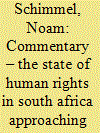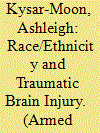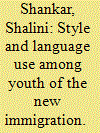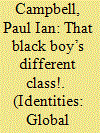|
|
|
Sort Order |
|
|
|
Items / Page
|
|
|
|
|
|
|
| Srl | Item |
| 1 |
ID:
193270


|
|
|
|
|
| Summary/Abstract |
As South Africa approaches 30 years of democracy, it is important to pause to reflect and analyze the trajectory of human rights since the fall of the apartheid regime and the advent of multiracial democracy. Although there was a large global movement against apartheid, this movement's vigilance for human rights in South Africa quickly declined and dissolved with the advent of South African democracy. There is little critical engagement with South Africa's contemporary human rights record and policies by global human rights activists, nongovernmental organizations, and civil society and still less active campaigning in defense of the human rights of South Africans, especially South Africa's most vulnerable and disadvantaged black majority. The energy that was summoned to protest apartheid and to boycott it never returned since the advent of democracy. This commentary explores the current state of human rights in South Africa, their prospects, and challenges to their respect, protection, and fulfillment.
|
|
|
|
|
|
|
|
|
|
|
|
|
|
|
|
| 2 |
ID:
163581


|
|
|
|
|
| Summary/Abstract |
The authors examine racial/ethnic differences in screening positive for traumatic brain injury (TBI) and in diagnosis among service members upon returning from war in Afghanistan and Iraq. Using data from the Post-Deployment Health Assessment and Re-Assessment, and military health-care encounters from 2008 to 2009, they estimate logistic regressions in a sample of 46,488 service members. Hispanic and Asian service members do not differ from White service members in screening positive for TBI but have 19% and 33% lower odds of diagnosis, respectively. Compared to White service members, Black service members are less likely to screen positive for TBI immediately after deployment and about as likely 3–6 months later, yet have 27% lower odds of diagnosis. Further, racial/ethnic minority service members have a lower probability of TBI diagnosis than White service members at all self-reported symptom levels, suggesting there is a discrepancy between symptoms and diagnosis related to race/ethnicity.
|
|
|
|
|
|
|
|
|
|
|
|
|
|
|
|
| 3 |
ID:
177005


|
|
|
|
|
| Summary/Abstract |
We build on prior research examining military involvement and criminal involvement by investigating the importance of acquiring the more complete “respectability package” that includes marriage as well as military experience and variations among White and Black respondents. Using data from Waves I and IV of the National Longitudinal Study of Adolescent to Adult Health (Add Health; n = 5,801), analyses use logistic regression models to assess associations of military service, marriage, and race with odds of reoffending among White and Black young adults who reported offending at Wave I. Military involvement was associated with lower odds of offending for Black respondents only, while marriage was associated with decreased odds of reoffending across both groups. Among Black respondents, analyses also highlighted the importance of acquiring both components of the respectability package (military service and marriage) in the context of today’s all-volunteer force in reducing criminal involvement.
|
|
|
|
|
|
|
|
|
|
|
|
|
|
|
|
| 4 |
ID:
113901


|
|
|
|
|
| Publication |
2011.
|
| Summary/Abstract |
In this article I consider "style" as a linguistic and cultural concept that can demonstrate how identities performed through language use are linked to topics of central concern in studies of immigrant youth, including racial and ethnic formation, generational cohorts, acculturation, assimilation, and gender. I draw on anthropological and sociolinguistic approaches to style not generally considered in migration studies and present ethnographic data of two cliques of Desi (South Asian American) teens in a Northern California high school. I argue that analyses of youth style can substantially complicate assimilation frameworks by highlighting the ways in which young peoples' linguistic practices may not fit neatly into commonly used analytical categories of "immigrant" and "American." Focusing on how political economy and local histories inform power and difference that shape migration experiences for youth, the article moves beyond routinely examined areas of heritage language retention and loss to analyze the significance of youth performances of heritage languages as well as English.
|
|
|
|
|
|
|
|
|
|
|
|
|
|
|
|
| 5 |
ID:
171067


|
|
|
|
|
| Summary/Abstract |
Seldom has leisure as a cultural activity been used to examine the boundary-work and lived realities of black middle-class men in the UK. Drawing on ethnographic data taken from a three-year study of one East-Midlands based African-Caribbean founded football club c.1970-2010, the article addresses these points. It widens existing knowledge on the British black middle-classes in three ways. (1) It indicates that the emergence of the black middle-classes in Leicester is discontinuous, and connected to wider social policies designed to improve the effectiveness of front-line services and pacify urban black youth in the 1980s. (2) Using Lacy’s black Lower and Upper middle-class (BLMC and BUMC) schemata, the paper sketches-out the boundary-work which exist between the club’s black working-class and BLMC and BUMC members, and between the BLMC and BUMC men within the club. (3) That sport possesses its own class-dimensions which further divided black men in Leicester during this period.
|
|
|
|
|
|
|
|
|
|
|
|
|
|
|
|
| 6 |
ID:
187074


|
|
|
|
|
| Summary/Abstract |
Research on ‘hegemonic masculinity’ needs to more specifically examine its hegemonic properties by analysing how masculine ideals embodied by white men have become pervasive and widely-accepted by men of colour through their voluntary compliance and consent. This paper analyses the influence of hegemonic masculinity on the lives of Japanese American men. Because they have adopted hegemonic masculinity as an idealised standard that they aspire to, but cannot attain, their subordinate masculinity is construed as inferior and effeminate, constraining their romantic power over women. Such negative assessments are shared by Japanese American women, who are also under the pervasive influence of hegemonic masculinity. In response, some Japanese American men attempt to appropriate the qualities of an idealised manliness in public performances, indicating how they continue to conceive of their masculinities in hegemonic terms. Although a few of them valorised Asian American manhood in order to challenge hegemonic conceptions, such alternative masculinities may eventually be appropriated by hegemonic masculine discourses to perpetuate pre-existing racial inequalities.
|
|
|
|
|
|
|
|
|
|
|
|
|
|
|
|
| 7 |
ID:
185605


|
|
|
|
|
| Summary/Abstract |
Why do communities with larger shares of ethnic and racial minorities have worse public goods provision? Many studies have emphasized the role of diversity in hindering public outcomes, but the question of causality remains elusive. The authors contribute to this debate by tracing the roots of both contemporary racial demography and public goods provision to the uneven historical expansion of the state. Focusing on new historical data from Brazil, the authors show that more remote municipalities with lower levels of state capacity in the past were more frequently selected by escaped slaves to serve as permanent settlements. Consequently, such municipalities have worse public services and larger shares of Afro-descendants today. These results highlight the pervasive endogeneity of the relationship between ethnic demography and public outcomes. The failure to account for context-dependent historical confounders raises concerns about the validity of previous findings regarding the social costs and benefits of any particular demographic composition.
|
|
|
|
|
|
|
|
|
|
|
|
|
|
|
|
|
|
|
|
|